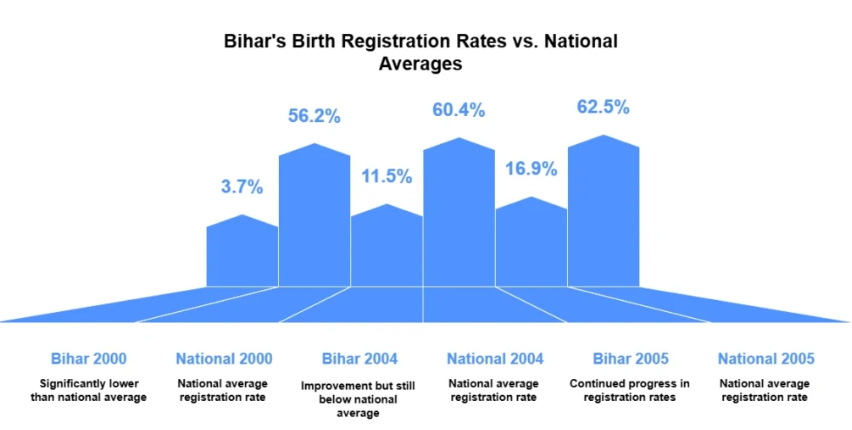
A recent report reveals that Bihar continues to lag behind in birth registration compared to other Indian states. Despite national efforts to improve civil registration, the state has shown minimal progress, raising concerns about access to public services, health care, and identity documentation for newborns. The report highlights systemic issues, administrative gaps, and the urgent need for awareness and policy reform.
The Civil Registration System (CRS) 2009 report reveals that Bihar has consistently underperformed in birth registration, with figures lagging far behind the national average. This issue gains renewed significance amid the ongoing Special Intensive Revision (SIR) of electoral rolls in Bihar, which mandates documentation of birth details.
Key Findings:
In 2000, Bihar’s birth registration stood at 3.7%, versus 56.2% nationally.
By 2005, Bihar improved to 16.9%, still far below the national average of 62.5%.
The CRS observed a significant gap between estimated and registered births in Bihar, Uttar Pradesh, and Andhra Pradesh.
In 2022, Bihar registered 71% of births within 21 days, yet it still falls into the 50–80% compliance bracket.
Recent Developments:
As per the amended Registration of Births and Deaths Act, 1969 (2023), digital birth certificates are now mandatory for school admissions and electoral updates for births after October 1, 2023.
The Election Commission’s SIR exercise requires proof of date and place of birth for those born after December 2, 2004, raising concerns about exclusion and accessibility in low-registration regions.
Critics, including political leaders, argue that such documentation could be a proxy for citizenship verification similar to NRC, risking disenfranchisement of legitimate residents.
Challenges in Bihar’s Registration System:
Weak Institutional Enforcement: Hospitals often fail to report births within the mandated 21-day window, despite clear legal obligations.
Administrative Apathy: Lack of robust follow-up mechanisms, especially in rural and underdeveloped areas, limits compliance.
Low Awareness: Families, particularly in marginalised communities, remain unaware of the importance and legal utility of birth registration.
Infrastructural Deficits: Shortage of trained personnel, digital systems, and coordination between local bodies and registration offices.
Implications:
Democratic Rights: Inadequate birth registration may lead to denial of voting rights due to inability to prove age and citizenship.
Social Welfare Access: Birth certificates are critical for accessing education, health services, and government schemes.
Data Reliability: Poor CRS compliance undermines the accuracy of demographic planning and public policy targeting.
Way Forward:
Strengthen Enforcement: Penalize institutions that do not report births within 21 days and incentivize compliance.
Digital Integration: Ensure real-time linkage of medical institutions with CRS platforms.
Awareness Campaigns: Use ASHA workers, panchayats, and media to promote registration awareness.
Simplify Documentation: Streamline processes especially in rural belts to reduce dependency on multiple ID proofs.
Safeguard Rights: Ensure that documentation requirements for electoral inclusion do not lead to arbitrary exclusions or suspicion-based verification.
Conclusion:
The persistent gaps in birth registration in Bihar reflect deeper structural and institutional deficiencies. While recent legal reforms and technological interventions offer an opportunity to improve civil registration, the state must prioritize inclusive implementation, administrative accountability, and citizen awareness to ensure that no individual's legal identity and rights are denied due to systemic lapses.
UPSCMainsPractice Question
Ques: Critically examine the role of the Civil Registration System (CRS) in ensuring inclusive governance.What challenges do states like Bihar face in implementing it effectively?(250 Words)05-Jul-2025 08:17 PM
After a historic gap of 41 years since Rakesh Sharma's...
02-Jul-2025 07:13 PM
Karnataka is facing a severe groundwater crisis, especially in its...
02-Jul-2025 07:07 PM
At the United Nations, External Affairs Minister Dr. S. Jaishankar...
02-Jul-2025 02:28 PM
A Geographical Indication (G.I.) tag is designed to protect products...
02-Jul-2025 02:17 PM
A recent report reveals that Bihar continues to lag behind...
26-Jun-2025 04:05 PM
Discover how India’s MSMEs are shaping the future through the...
02-Jul-2025 02:28 PM
A Geographical Indication (G.I.) tag is designed to protect products...
02-Jul-2025 07:07 PM
At the United Nations, External Affairs Minister Dr. S. Jaishankar...
02-Jul-2025 07:13 PM
Karnataka is facing a severe groundwater crisis, especially in its...
Leave a Comment